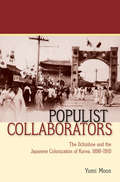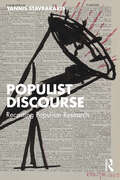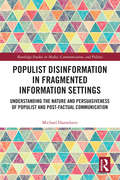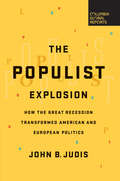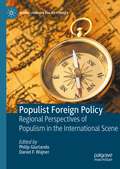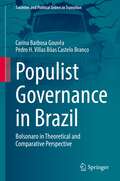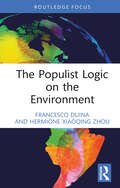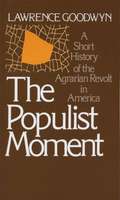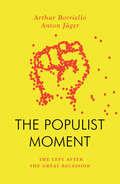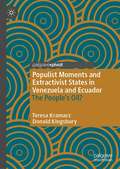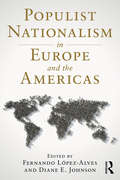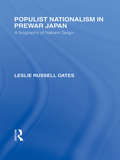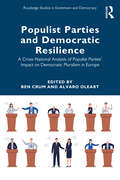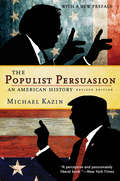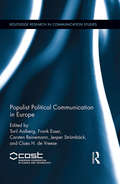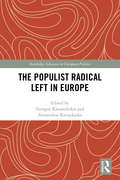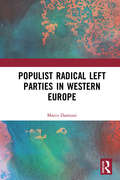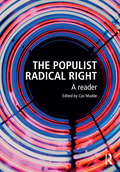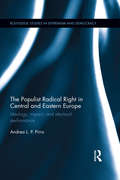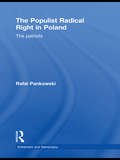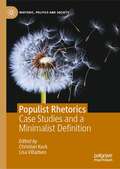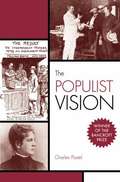- Table View
- List View
Populist Collaborators: The Ilchinhoe and the Japanese Colonization of Korea, 1896–1910
by Yumi MoonAn empire invites local collaborators in the making and sustenance of its colonies. Between 1896 and 1910, Japan's project to colonize Korea was deeply intertwined with the movements of reform-minded Koreans to solve the crisis of the Choson dynasty (1392-1910). Among those reformers, it was the Ilchinhoe (Advance in Unity Society)-a unique group of reformers from various social origins-that most ardently embraced Japan's discourse of "civilizing Korea" and saw Japan's colonization as an opportunity to advance its own "populist agendas." The Ilchinhoe members called themselves "representatives of the people" and mobilized vibrant popular movements that claimed to protect the people's freedom, property, and lives. Neither modernist nor traditionalist, they were willing to sacrifice the sovereignty of the Korean monarchy if that would ensure the rights and equality of the people.Both the Japanese colonizers and the Korean elites disliked the Ilchinhoe for its aggressive activism, which sought to control local tax administration and reverse the existing power relations between the people and government officials. Ultimately, the Ilchinhoe members faced visceral moral condemnation from their fellow Koreans when their language and actions resulted in nothing but assist the emergence of the Japanese colonial empire in Korea. In Populist Collaborators, Yumi Moon examines the vexed position of these Korean reformers in the final years of the Choson dynasty, and highlights the global significance of their case for revisiting the politics of local collaboration in the history of a colonial empire.
Populist Discourse: Recasting Populism Research
by Yannis StavrakakisPopulist Discourse: Recasting Populism Research offers a refreshingly innovative discourse theory perspective on populist phenomena. Reading this book will help you familiarize yourself with the historical genealogy of significant populist phenomena from the end of the 19th century onwards and with the main conceptual/theoretical accounts established to analyse them. Mainstream conceptualizations of populism in both academia and public discourse are critically discussed in order to map new, promising avenues for research. Inspired by the works of Ernesto Laclau and Chantal Mouffe, the book addresses current challenges within populism research and highlights the new directions that a conceptually nuanced, theoretically rigorous and historically informed discursive orientation can contribute to the contemporary study of populism. Without sacrificing attention to detail, strong bibliographical support and a focus on the future development of populism research, Populist Discourse is written in accessible language to engage populism scholars, advanced undergraduates and graduate-level students within the field of political science. Due to its interdisciplinary character, it will also appeal to readers associated with various politically informed area studies and the broader field of ideology and discourse analysis.
Populist Disinformation in Fragmented Information Settings: Understanding the Nature and Persuasiveness of Populist and Post-factual Communication (Routledge Studies in Media, Communication, and Politics)
by Michael HameleersIn this highly relevant work, Dr. Michael Hameleers illuminates the role of traditional and social media in shaping the political consequences of populism and disinformation in a mediatized era characterized by post-factual relativism and the perseverance of a populist zeitgeist. Using comparative empirical evidence collected in the US, the UK, and the Netherlands, this book explores the politics and discursive construction of populism and disinformation, how they co-occur, their effects on society, and the antidotes used to combat the consequences of these communicative phenomena. This book is an essential text for students and academics in communication, media studies, political science, sociology, and psychology.
The Populist Explosion: How the Great Recession Transformed American and European Politics
by John B. JudisPopulism is on its biggest run since the Second World War, in the United States (Tea Party, Occupy Wall Street, Bernie Sanders, Donald Trump); France (National Front); Britain (United Kingdom Independence Party); Finland (Finns Party), Denmark (People's Party) and more on the right; Spain (Podemus), Italy (Five Star Movement), Greece (Syriza) and others on the left. These movements and candidates are an early warning sign of the breakup of the political consensus that has reigned in the U.S. and Europe since the 1980s. How did the Great Recession help reawaken such a disparate but powerful framework of political appeal all across the Atlantic? Veteran political reporter John Judis offers a coherent big picture of how we got here that every reader of politics no matter their party affiliation will need to read.
Populist Foreign Policy: Regional Perspectives of Populism in the International Scene (Global Foreign Policy Studies)
by Philip Giurlando Daniel F. WajnerThis book explores the global phenomenon of populism in relation to states' foreign policy, addressing two key questions: How do populists mold their foreign policies? What are the domestic and external factors that enable and constrain it? To this end, the book brings together a diverse group of scholars who have already researched on populist foreign policies (PFP) in specific countries to contribute shared chapters that examine their drivers, patterns, and effects according to distinctive regions: North America, Western Europe, Southern Europe, Central-Eastern Europe, Latin America, South-East Asia, the Middle East, Oceania, and Africa. The empirical analysis sheds new light on how populists’ distinctive conception of a world divided antagonistically between “the people” and “the elites” influences behaviour towards multilateral organizations such as the United Nations and the European Union, and regional or global hegemonic powers like the United States, Germany, Russia, and China. The book also shows how ideas related to identity, ideology, status and emotions, impinge on populists’ conduct vis-à-vis other international actors, and how national and international structures affect the implementation of populist foreign policies in the regional, interregional, and global arenas. The wide geographical diversity and regional representation are also valuable in identifying cultural similarities and differences. Hence, the findings contribute to lively debates on whether there is a unified and coherent foreign policy among populist leaderships, and whether populism leads to a gradual “corrective” of transnational trends in contemporary politics or, conversely, to a more radical, structural shift in the liberal international order.
Populist Governance in Brazil: Bolsonaro in Theoretical and Comparative Perspective (Societies and Political Orders in Transition)
by Carina Barbosa Gouvêa Pedro H. Castelo BrancoThis book addresses the field of populisms from a contemporary perspective. The book brings a conceptual, qualitative, culturally sensitive and transformative approach to containing populist governance. The authors set out not only examine and compile the most varied conceptual definitions, but also present a theoretical definition in which they recognize a myriad of variable properties of populisms which are strategies commonly used in specific political contexts. Furthermore, with its own methodology, the book shows the use of a working method whose analysis was designed to apply the definition of populism applicable in any national context and answer the following hypothesis: the political and normative actions undertaken in the political system could be characterized as a populist movement in its formal and/or informal aspects, directly or indirectly? In this perspective, variable properties are attributes that allow to establish a traceable relationship through a set of specific indicators for its operationalization and empirical tests. The book also applies the definition of populisms in the political and normative actions undertaken by Jair Messias Bolsonaro in Brazil, presenting an extensive repertoire of mechanisms which understanding could contribute to contain populism, with the proper adaptations to the characteristics of each context. Reading Populisms will certainly contribute to the readers having more conceptual tools to analyze this global phenomenon that threatens the building of democratic constitutionalism as well as to understand how the growth of populism is associated with the weaknesses of liberal democracy.
The Populist Logic on the Environment (Transforming Environmental Politics and Policy)
by Francesco Duina Hermione Xiaoqing ZhouThe Populist Logic on the Environment provides a framework that draws from populism’s essence to explain populist politicians’ approaches to the environment. Over the past few decades, populism has spread across the world – particularly in Europe, but also notably in the US, South America, and Asia. Its essential features – especially its ideological 'thinness' – mean that we can observe considerable variations across populists in their environmental stances. This holds across the political spectrum from the left to the right, despite the traditional tendency of right-wing parties to be skeptical of pro-environmental positions and of left-wing parties to subscribe to them. Regardless of variations, however, ‘true populists’ can be expected to consistently anchor environmental stances in people-centrism and anti-elitism – in ways linked to additional party-specific factors. This book systematizes analytically what the literature observes, corrects some of its empirical limitations, and allows for reflection on the commitment by any one populist party to the environment. The authors undertake a cross-regional analysis of four case studies to illustrate their argument: Marine Le Pen’s National Rally in France, the US Republican Party led by Donald Trump, Spain’s Podemos led by Pablo Iglesias, and Hugo Chávez and Nicolás Maduro’s socialist regime in Venezuela. This book will appeal to scholars and students of political science, public policy, environmental studies, sociology, and geography, as well as a general audience interested in populism and the environment.
The Populist Moment: A Short History Of The Agrarian Revolt In America
by Lawrence GoodwynThis condensed version of Lawrence Goodwyn's Democratic Promise, the highly-acclaimed study on American Populism which the Civil Liberties Review called "a brilliant, comprehensive study," offers new political language designed to provide a fresh means of assessing both democracy andauthoritarianism today.
The Populist Moment: The Left After the Great Recession (Jacobin)
by Anton Jager Arthur BorrielloA Left-wing populist insurgency exploded across the West in the wake of the Great Financial CrisisAfter decades of retreat, the last decade saw a left resurgence from the US to Western Europe and the Mediterranean. This revival of anti-establishment left-wing candidates was not only left but also populist. Though in most cases these movements ran out of steam before effectively being in a position wield state power, many of the parties and figures associated with this wave of left populism have entered government and others are still contesting high office.Providing a blow-by-blow history of the rise and defeat of left electoral movements in the West, Boriello and Jaeger guide us through the conditions that shaped this wave of insurgencies. These include extreme and rising inequality, the collapse of civic life, and a lack of trust in traditional institutions.In this context, Boriello and Jaeger argue that some or another form of populism was all but inevitable. And, despite defeats, left offensives of present and future will be populist in nature. This is because the conditions that shaped the first left populist wave are still very much with us.
Populist Moments and Extractivist States in Venezuela and Ecuador: The People’s Oil?
by Teresa Kramarz Donald KingsburyThis book addresses the intersection of extractivism, populism, and accountability. Although populist politics are often portrayed as a driver of poor environmental governance, Populist Moments and Extractivist States identifies it as an intervening variable at best – one that emerges in response to the accountability deficits of extractive states. Case studies in Venezuela – for many, the prototypical petrostate – and Ecuador – which exchanged agribusiness dependency for oil decades later – illustrate how extractive states are oriented by a colonial logic of export and service. This logic regulates state-society-nature relationships and circumscribes avenues for local stakeholders to hold public officials and extractive industries to account for environmental and human harms. Populist moments of the early 21st century across Latin America responded to these conditions, promising more equitable and sustainable futures. However, rather than reversing the technocracy, verticalism, and exclusion of the recent past, populist moments often intensified and legitimated them in the drive to maximize and distribute resource rents. The result has been cyclical, as populist moments of hope and rupture fall prey to the extractivist states they tried, and failed, to replace.
Populist Nationalism in Europe and the Americas
by Diane E. Johnson Fernando López-AlvesPopulist nationalism fuses beliefs that citizens are being exploited by a privileged elite with claims that the national culture and interests are under threat from enemies within or without. Ideologically fluid, populist nationalists decry “out-of-touch” institutions such as political parties and the mainstream press while extolling the virtues of the “people.” They claim that only populists can truly represent the nation and solve its problems, and often call for unorthodox solutions that appeal to the common people. The recent spread of populist nationalism throughout the world has triggered a growing interest in the subject, led mainly by journalists. The Brexit vote and the election of Donald Trump in the US have provoked a flurry of media coverage in Europe and the Americas, along with parliamentary debates. Some social scientists have sought to explain the resurgence of nationalism and the spread of populism in recent decades, but important questions remain and most of the scholarship has not adequately addressed the fusion of nationalism and populism. It fails to examine the combination of populism and nationalism comparatively, especially the contrast between the more progressive and leftist versions such as those in Latin America, and the more traditional conservative varieties that are gaining strength in Germany, the United Kingdom, and the United States. This interdisciplinary collection by experts on Europe and the Americas fills this void. The volume examines various experiences with populist nationalism, and offers theoretical tools to assess its future. Some chapters are in-depth country case studies and others take a broader perspective, but all open the door for meaningful comparison.
Populist Nationalism in Pre-War Japan: A Biography of Nakano Seigo (Routledge Library Editions: Japan)
by Leslie R OatesNakano has received very little attention in works in English on the relevant period, as his approaches to effective power were limited while his career also lacks the violent drama associated with movements resorting to terrorism. Even in Japan he has not been made the subject of much academic enquiry. Though remaining a fairly well-known figure he is more generally consigned to the class of ‘ultra-nationalists’ who are blamed for the disaster of Japan’s defeat. This book uses material from the few biographies available in conjunction with some short sketches of Nakano by others, biographies of associates and official publications covering his and related political activities. Primary sources include a representative range of Nakano’s own writings, as well as speeches in the Diet. Interviews with Nakano’s two surviving sons and other close associates also feature.
Populist Parties and Democratic Resilience: A Cross-National Analysis of Populist Parties’ Impact on Democratic Pluralism in Europe (Routledge Studies in Extremism and Democracy)
by Ben Crum and Alvaro OleartPopulist Parties and Democratic Resilience focuses on populist parties as the main agents of populism and examines when these parties turn anti-democratic and when they remain loyal to the democratic system. Following the Brexit referendum, the election of Donald Trump, and the rise of populist parties around the globe, many observers suggested that democracy was in serious trouble. Nevertheless, while some democratic systems have been seized by populists, most of them have proven resilient. In this volume, the authors identify the conditions under which populist parties become inimical to political and societal pluralism. They offer in-depth analyses of the trajectory of populist parties in eleven European Union countries (Austria, Belgium, Czech Republic, France, Germany, Hungary, Italy, The Netherlands, Poland, Romania, and Spain). The book shows that, reflecting the diversity of national contexts, there are multiple pathways whereby populist parties’ power can remain contained and subject to democratic checks and balances. Moreover, populist parties can — at times voluntarily, at other times by force of external conditions — come to adhere to the democratic rules of the game. On this basis, the volume outlines different ways in which European democracies can successfully accommodate populist parties through strategies that carefully navigate between the extremes of uncritical acceptance and outright ostracization. Drawing on the literature on democratic theory and comparative politics, this book directly contributes to the public debate on the state of democracy in Europe. It will be of interest to researchers of comparative politics, European politics, party politics, democracy, and populism.
The Populist Persuasion: An American History
by Michael Kazin"Kazin has written a thoughtful and important book on one of the more consequential movements in American politics-populism. Tracing the emergence of populist campaigns from the 19th century to the present day, he looks at such movements as the labor movement, the prohibitionist crusade, Catholic radio populist Father Coughlin, the New Left, and the recent advance of conservative populism, as identified with such figures as George Wallace and Ronald Reagan. Kazin opens by saying, 'I began to write this book as a way of making sense of a painful experience: the decline of the American Left, including its liberal component, and the rise of the Right.' Anyone interested in either political tendency will find this book both informative and engaging. It is a powerful, elegantly written, and observant study that never fails to retain the reader's interest."--Library JournalFor the revised Cornell edition, Michael Kazin has rewritten the final chapter, bringing his coverage of American populism up to the 1996 presidential election, and he has added a new conclusion.
The Populist Persuasion: An American History
by Michael KazinIn The Populist Persuasion, the distinguished historian Michael Kazin guides readers through the expressions of conflict between powerful elites and "the people" that have run through our civic life, filling it with discord and meaning from the birth of the United States until the present day. Kazin argues persuasively that the power of populism lies in its adaptable nature. Across the political spectrum, commentators paste the label on forces and individuals who really have just one big thing in common: they are effective at blasting "elites" or "the establishment" for harming the interests and betraying the ideals of "the people" in nations that are committed, at least officially, to democratic principles. Kazin’s classic book has influenced debates over populism since its publication. The new preface to this edition brings the story up to date by charting the present resurgence of populist discourse, which was front and center in the 2016 elections and in the Brexit debate.
Populist Political Communication in Europe (Routledge Research in Communication Studies)
by Carsten Reinemann Frank Esser Jesper Stromback Toril Aalberg Claes De VreeseIn an increasing number of countries around the world, populist leaders, political parties and movements have gained prominence and influence, either by electoral successes on their own or by influencing other political parties and the national political discourse. While it is widely acknowledged that the media and the role of communication more broadly are key to understanding the rise and success of populist leaders, parties and movements, there is however very little research on populist political communication, at least in the English-speaking research literature. Originating from a research project funded by the European Cooperation in the field of Scientific and Technical Research (COST), this book seeks to advance this research. It includes examinations 24 European countries, and focuses on three areas within the context of populism and populist political communication: populist actors as communicators, the media and populism and citizens and populism.
The Populist Radical Left in Europe (Routledge Advances in European Politics #1)
by Giorgos Katsambekis Alexandros KioupkiolisBuilding on a comprehensive theoretical framework that draws on discursive and ideational approaches to populism, this volume offers a comparative mapping of the Populist Radical Left in contemporary Europe. It explores the novel discursive, political and organisational features of several political actors, as well as the conditions of their emergence and success, while being alert to the role of relevant social movements. Chapters feature case studies of the Greek party Syriza, the Spanish Podemos, the German Die Linke, Jean-Luc Mélenchon and France Insoumise, the Dutch Socialist Party and the Slovenian Levica. Jeremy Corbyn’s leadership of Labour in the UK and ‘Momentum’, the movement that supports him is also examined. A separate chapter is devoted to recent grassroots social movements that can be seen as instances of progressive populism, such as the ‘squares movement’ in Spain and Greece. This book fills a crucial gap in the literature on radical left politics and populism in Europe, contributing to the rapidly burgeoning field of populism studies.
Populist Radical Left Parties in Western Europe: Equality and Sovereignty
by Marco DamianiThis book provides a comparative analysis and a systemic categorization of the Populist Radical Left Parties (PRLPs) in Western Europe. Institutional and socio-economic aspects have transformed the political culture of many modern democracies, leading to the creation of radical left-wing parties who, by combining a strongly populist political offer with the historical demands of the traditional left wing, are capable of electoral success. This book analyzes a range of different Populist Radical Left Parties (PRLPs) in Western Europe through in-depth case studies. The author uses statutes, internal documents, programs, election results, membership data, and international political literature combined with interviews with executives and national secretaries to describe and interpret the main features of PRLPs, their paths of formation and political transformation. This volume will appeal to scholars and students of political science and political sociology, media studies and anyone interested in trying to better understand European populism and the distinctions among its different forms.
The Populist Radical Right: A Reader (Routledge Studies in Extremism and Democracy)
by Cas MuddeThe populist radical right is one of the most studied political phenomena in the social sciences, counting hundreds of books and thousands of articles. This is the first reader to bring together the most seminal articles and book chapters on the contemporary populist radical right in western democracies. It has a broad regional and topical focus and includes work that has made an original theoretical contribution to the field, which make them less time-specific. The reader is organized in six thematic sections: (1) ideology and issues; (2) parties, organizations, and subcultures; (3) leaders, members, and voters; (4) causes; (5) consequences; and (6) responses. Each section features a short introduction by the editor, which introduces and ties together the selected pieces and provides discussion questions and suggestions for further readings. The reader is ended with a conclusion in which the editor reflects on the future of the populist radical right in light of (more) recent political developments – most notably the Greek economic crisis and the refugee crisis – and suggest avenues for future research.
The Populist Radical Right and Health: National Policies and Global Trends
by Michelle Falkenbach Scott L. GreerThis contributed volume is the first in-depth analysis of the health policies of populist radical right (PRR) parties worldwide and their actual involvement in health care. The prominence of authoritarian, nationalistic, and populist parties is expanding steadily. However, it is often difficult to discern what kind of policies they really stand for, particularly with regard to the welfare state and public health, where research remains sparse. This book fills this critical gap. The text connects PRR parties and leaders with actual health and social policy effects in Eastern and Western Europe as well as in the United States, Brazil, and the Philippines. The chapters highlight ten individual country case studies authored by young scholars and professors with political science and health experts: The Austrian Freedom Party in Government: A Threat to Public Health? The Alternative for Germany (AfD) and Health Policy: Normalization or Containment of Populist Radical Right Tendencies? Populist Radical Right Influence on Health Policy in the Netherlands: The Case of the Party for Freedom (PVV) The Evolution of the Populist Radical Right and Their Impact on Health in Italy The Populist Radical Right and Health in Hungary Is the Polish 'Law and Justice' (PiS) a Typical Populist Radical Right Party? A Health Policy Perspective The Case of the United Kingdom Independence Party (UKIP) Rhetoric and Reality in the United States of America: Trump, Populism, and Health Policy Ruling Through Chaos in Brazil: Bolsonaro's Authoritarian Agenda for Public Health An Authoritarian Reaction to COVID-19 in the Philippines: A Strong Commitment to Universal Health Care Combined with Violent Securitization The Populist Radical Right and Health is exceptionally timely and essential reading for political science and health colleagues researching and writing about PRR parties and leaders; students and faculty in public health, health and social policy, and political science; and anyone interested in learning more about this topic.
The Populist Radical Right in Central and Eastern Europe: Ideology, impact, and electoral performance (Extremism and Democracy)
by Andrea L. PirroOften neglected in the study of far right organisations, post-communist Europe recently witnessed the rise and fall of a number of populist radical right parties. The Populist Radical Right in Central and Eastern Europe is the first comparative study to focus on the ideology, impact, and electoral performance of this party family in the region. The book advances a series of arguments concerning the context and text of these parties, and systematically analyses the supply-side and demand-side of populist radical right politics. Whilst populist radical right parties in Central and Eastern Europe maintain broad similarities with their West European counterparts, they come across as a distinct phenomenon worthy of study in their own right. Parties like Ataka (Bulgaria), Jobbik (Hungary), and the SNS (Slovakia) resort to historical legacies and contextual idiosyncrasies to frame their ideology; interact with other parties over a number of policy areas; and ultimately compete for public office on the basis of their nativist agenda. The book provides a novel framework for the analysis of different aspects of populist radical right politics, notably enhancing the understanding of this phenomenon by means of primary data such as personal interviews with party leaders and original expert surveys. Using the ideological features of these parties as an overarching analytical tool, this book is essential reading for students and scholars researching the far right, post-communist issues and European politics in general.
The Populist Radical Right in Poland: The Patriots (Extremism and Democracy)
by Rafal PankowskiIn this important and accessible study, Rafal Pankowski makes sense of the rapid growth of organized radical nationalism on the political level in Poland by showing its origins, its internal dynamics and the historical, political, social and cultural context that has made it possible. From political obscurity to the heart of mainstream politics, the recent rise of the extreme right in the Polish context surprised many observers. In the 1990s Poland was usually referred to as a country without significant extremist or populist movements. It was considered to be a stable, even if young, democracy, and ‘extremists’ were perceived as just a little nuisance to the liberal-democratic consensus. By the mid-2000s, the picture changed completely, two populist radical right parties entered into a coalition government with the right-wing conservative Law and Justice Party. All of a sudden, racist extremist affiliations were not a hindrance to a high-level career, but were tolerated or even seemed positively valued. The entrance of extremists into state structures was no longer a matter of isolated individual cases, but took on systemic features. Presenting a detailed analysis of the Polish national populism, the book will use theories of social movements (in particular the concept of discursive opportunity structure), as well as relevant theories of transition and democratization. In particular, the specific cultural resources of Polish nationalist populism are to be analyzed because they are deemed to be among principal reasons for the relative success of the radical nationalists and their particular brand of identity politics The book not only provides a detailed analysis of Polish nationalism but will also have a much broader trans-national significance, essential reading for scholars of national populism in the context of post-communism and beyond.
Populist Rhetorics: Case Studies and a Minimalist Definition (Rhetoric, Politics and Society)
by Christian Kock Lisa VilladsenThis book proposes a unified approach to populism that sees it as a primarily rhetorical concept. Populism is on the rise worldwide with both populist leaders and movements gaining power, and the term “populism” resounds in political debate, journalism, and scholarship. Populism as a phenomenon seems to instantiate perennial issues besetting rhetoric (e.g., the charges of manipulation, exclusive reliance on opinion over knowledge, and abuse of emotional appeals), yet relatively little research on populism has emerged from the discipline of rhetoric. This volume investigates the theory and practice of populism under the heading of rhetoric but as an interdisciplinary effort involving scholars in rhetoric as well as neighbouring disciplines such as political science and sociology. Seven case studies covering Germany, Greece, Hungary, Italy, UK, USA, and Venezuela offer conceptual discussions as well as close analyses applying both historical and theoretical approaches. In the introduction, the editors outline the problem of populism and their project, presenting the book’s wide-spanning case-based explorations. In an afterword they seek to distil a “minimal” rhetorical definition of populism. The claim or pretense to speak for “the people” emerges as the feature that connects the highly diverse instances studied in the book—and populisms in general, the editors hypothesize. They argue that this prevalent rhetorical move, often glossed over as unremarkable and banal, is in principle more debatable and deserving of more vigilant scrutiny than usually assumed.
The Populist Vision
by Charles PostelThe Populist movement has been both dismissed as an irrational response of backward-looking farmers to modernity and romanticized as a resistance movement of tradition-based communities to modern, commercial society. Now, in a wide-ranging and provocative reassessment, based on a deep reading of archival sources, The Populist Vision argues the opposite - that the Populists understood themselves as, and in fact were, modern people, pursuing an alternative vision for modern America. Taking into account the leaders and the led, The Populist Vision uses a wide lens - focusing on the farmers, both black and white, men and women - but also looking at wage workers and bohemian urbanites. Ranging from Texas to the Dakotas, from Georgia to California, Charles Postel shows how farmer Populists strove to use the new innovations for their own ends. They sought scientific and technical knowledge, formed highly centralized organizations, launched large-scale cooperative businesses, and pressed for reforms on the model of the nation's most elaborate bureaucracy - the Postal Service. Hundreds of thousands of women joined the movement, too, seeking education, employment in schools and offices, and a more modern life. Miners, railroad workers, and other labor Populists joined with farmers to give impetus to the regulatory state. Activists from Chicago, San Francisco, and other new cities provided Populism with a dynamic urban dimension. The winner of a prestigious Bancroft Prize and the Organization of American Historian's Frederick Jackson Turner Award, this highly original account of the Populist movement is essential reading for anyone interested in the politics, society, and culture of modern America.
Populistas: ¿Cuán populistas somos los peruanos? Un estudio empírico
by Carlos MeléndezCarlos Meléndez ha trazado una radiografía fascinante del elector peruano, en tiempos de creciente polarización y una crisis de gobernabilidad que parece permanente. ¿Cuán populistas somos los peruanos? ¿Es el populismo el verdadero denominador común de nuestros principales líderes políticos? La evidencia empírica indica que las respuestas a estas preguntas son ciertamente sorprendentes. Empleando como base una serie de sondeos de opinión y su propia experiencia como politólogo e investigador, Carlos Meléndez ha trazado una radiografía fascinante del elector peruano, en tiempos de creciente polarización y una crisis de gobernabilidad que parece permanente. Los rasgos que comparten Alberto Fujimori, Ollanta Humala, Martín Vizcarra, Francisco Sagasti y Pedro Castillo, entre otros rostros visibles de nuestro ecosistema político, son muchos más de lo que pensamos. La tendencia o ideología no es impedimento para satisfacer la demanda populista y la vocación anti-establishment que han marcado el devenir de la sociedad peruana en las últimas décadas. Esta investigación expone numerosos mitos derribados, así como verdades amargas que nuestros líderes y caudillos -de izquierda, derecha o de centro- difícilmente aceptarán. La complejidad del populismo como concepto no impide su omnipresencia en nuestro espectro político. Por el contrario, parece gobernarlo. Este libro nos ayudará a entenderlo y, de paso, entendernos un poco mejor como electores.
